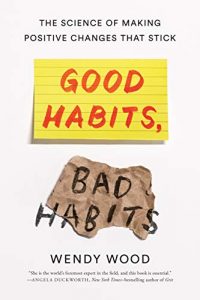 One of my bad habits is obsessing about my deficiency of good habits. I know that good habits are important because the nuns and monks were relentless in telling me so; decades later their ambivalence about my academic success without suitable discipline still lingers.
One of my bad habits is obsessing about my deficiency of good habits. I know that good habits are important because the nuns and monks were relentless in telling me so; decades later their ambivalence about my academic success without suitable discipline still lingers.
I’m not devoid of good habits. Lately, I’ve had some success with Jerry Seinfeld’s keep the streak going/don’t break the chain trick (Jerry Seinfeld’s Productivity Secret), although Friday’s NY Times Crossword stumped me, breaking a 355-day streak. Two and a quarter years ago, I managed to reboot a journaling habit by starting a Morning Pages effort.Â
Habits are on my mind lately for several reasons. Back in March, I finished Wendy Wood‘s Good Habits, Bad Habits: The Science of Making Positive Changes That Stick and thought it worth processing my thoughts into a post here. A bit slower than I would like, but not unusually so.Â
More recently, I came across an interesting blog post from Eleanor Konik, The Difficulties of Teaching Notetaking » Eleanor Konik. I’ve been chipping away at improving my own note-taking practices and was toying with how and whether to incorporate any of that into my teaching. Konik’s argument is that no one implements good techniques simply because they’re good techniques. We’re all adept at cost/benefit calculations and the payoff structures for most “good” habits are hugely dependent on how heavily you weight the suasion of authority figures. For most of us, most of the time, the payoff for following objectively good practices doesn’t rise to the effort.Â
This is where the accumulating research on habit formation comes in. Converting an activity from an invocation of willpower to automatic pilot effectively eliminates the effort and energy part of the equation. This is why Alfred North Whitehead’s observation continues to show up in discussions of habit:
 Civilization advances by extending the number of important operations which we can perform without thinking about them. Operations of thought are like cavalry charges in a battle- they are strictly limited in number, they require fresh horses, and must only be made at decisive moments.Â
We know that thinking is expensive. As knowledge workers, thinking is a definitional component of your work. One of the highest returns on IQ points is reducing the demand for IQ points wherever possible.Â
Woods offers an observation that I’ll close with;Â
we repeatedly do the things we love doing. But we also grow to love the things that we repeatedly do.
The task then is to be more intentional about the practices whose repetition will lay down the habits that will free up the capacity for better “operations of thought” when those decisive moments arrive.
Excellent and thoughtful piece as always. Viewing habits through the lens of cost/benefit helps me better understand a) the habits that I used to do and have fallen away from (the c/b calculus has shifted?) and b) those I habits can’t muster the will to begin (the *idea* of the habit apparently doesn’t outweigh the perceived effort to do it).
And yes, last Friday’s puzzle was rough. I stared at the NE corner for hours.